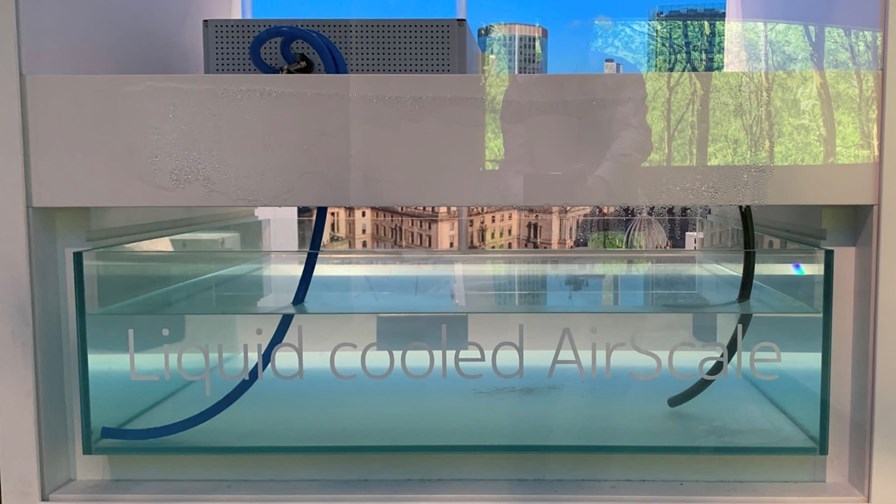
The liquid cooling system as displayed at MWC22
- Vendor adds liquid cooling to its AirScale baseband products, shows it off at #MWC22
- It is claiming significant ‘green network’ advantages compared with traditional air-cooling systems
- AT&T is trialling the system – all operators are keen to improve their energy efficiency
BARCELONA – Mobile World Congress 2022 – Nokia has announced the commercial availability from the third quarter of this year of its Liquid Cooling AirScale portfolio, which it says is “designed to make radio networks more sustainable and cost-efficient by reducing the energy required to cool a base station.”
The vendor claims the energy consumption related to cooling systems for any RAN technology – from 2G to 5G – can be reduced up to 90% and base station CO2 emissions by up to 80% compared to traditional active air-cooling systems (though it should be noted these statistics are based on the results of various pilot schemes run by Nokia and not from an independent third party).
The effort is capturing operator attention. BT’s chief architect Neil McRae told TelecomTV yesterday that finding ways to improve energy efficiency in communications networks has never been more important and that he is impressed with Nokia’s development, while AT&T is piloting the solution in a live network trial in Philadelphia, US.
Joe Taylor, VP Implementation, Provisioning & Optimization at AT&T, noted in a prepared statement that was part of Nokia’s announcement: “AT&T is committed to tackling climate change, enhancing the efficiency of our network, and reducing our operational carbon footprint. We’re pleased to work with Nokia as we take a more sustainable path and to trial its liquid-cooled base station in our network. We firmly believe that sustainability is one of the biggest factors impacting the world right now and is a key differentiator in business. We’re eager to continue aligning with like-minded, innovative companies like Nokia that are developing ground-breaking solutions to combat climate change.”
Such developments come at a critical time for the industry as operators densify their mobile networks and handle ever greater volumes of data while at the same time trying to improve energy efficiency to keep down operating costs and stand a chance of achieving their ‘green network’ targets.
And keeping the costs down is becoming increasing tricky as energy prices soar: BT, for example, is already the largest private purchaser of electricity in the UK, accounting for about 1% of the country’s total power consumption, much of which is used by having to still run legacy networks, so it will be keen to start deploying innovative technologies that can help reduce its reliance on the national power grid.
- Ray Le Maistre, Editorial Director, TelecomTV
Email Newsletters
Sign up to receive TelecomTV's top news and videos, plus exclusive subscriber-only content direct to your inbox.




